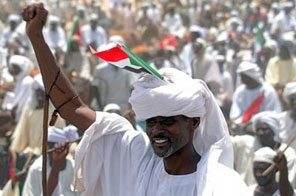AU to discuss Darfur crisis
ABUJA: African leaders meet in Nigeria on Thursday to discuss an African Union report on ways to resolve the six-year-long conflict in Sudan's western Darfur province.
Around 15 heads of African states who sit on the AU peace and security council, will examine the recommendations drawn up by a high-level AU panel led by South Africa's former president Thabo Mbeki.
The team was mandated to examine the situation in Darfur "in-depth" and propose ways on "how best the issues of accountability and combating impunity ... could be effectively and comprehensively addressed."
Mbeki's report is also expected to suggest means to achieve peace, healing and reconciliation in the region where a counter insurgency by mainly non-Arab Darfur inhabitants has claimed some 300,000 lives according to the United Nations.
One of the panel's key proposals is a "hybrid criminal court" composed of Sudanese and foreign judges to try those people accused of offences in Darfur, according to media reports in Khartoum.
Sudanese leader Omar al-Beshir, who faces an international arrest warrant for war crimes and crimes against humanity, is skipping the Abuja summit. International and local rights groups had called for his arrest had he landed in Nigeria.
Sudan will be represented at the talks by its influential Second Vice-President Ali Osman Taha, who is slated to make a statement at the opening session of the summit.
The UN says up to 300,000 people have died and 2.7 million fled their homes since ethnic minority rebels in the western region of Darfur first rose up against the Arab-dominated government in Khartoum in February 2003.
The Sudanese government disputes the death toll saying 10,000 people died.
The summit is also expected to discuss the crises in Niger and Guinea, according to senior officials.
The African Union had given Guinea's junta leader Captain Moussa Dadis Camara until Saturday October 17 to make a written pledge not to stand in the January presidential election, as per his promise when he seized power following the death of longtime strongman Lansana Conte. Failure to do so was going to attract sanctions on the bauxite rich west African country.
But Camara has said he wants the issue of his standing in presidential polls to be taken up for international mediation.
At least 157 unarmed activists demonstrating at Camara's apparent about face on the vote were gunned down by government soldiers at a Conakry stadium on September 28.
Over 1,000 were injured, including women raped by the soldiers.
Uranium-rich Niger has also been a thorn in the flesh of the African Union following President Mamadou Tandja's resolve to cling onto power after his 10-year tenure ends in December.






